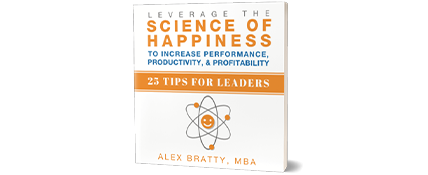Self-leadership. What is it and why does it matter?
Essentially, it’s all about being self-aware, being accountable for your skills and behavior, and making sure you’re taking care of yourself—emotionally, physically, and mentally.
Now, when I bring up this topic, I sometimes get eye-rolls from leaders who explain they’re too busy to engage in a bunch of ooey-gooey “self-care.”
But, let me assure you that this is not soft stuff. In fact, it’s backed up by hard data, which shows that self-awareness and self-leadership are crucial aspects of being an effective leader.
Why?
If you can’t lead and take care of yourself, you can’t expect to lead and take care of others.
Of course, there are several ways you can engage in self-leadership. What I’m sharing here is the method that has worked for me and my clients. It’s based on a framework that was developed by the father of positive psychology, Dr. Martin Seligman at the University of Pennsylvania. (If you want to check out his extensive research in an easy-to-digest way, pick up the book, Flourish. It’s a quick and fascinating read.)
The framework is officially called the PERMA Theory of Well-Being. PERMA stands for Positive Emotions, Engagement, Relationships, Meaning, and Accomplishments. The idea is that when you’re checking off the boxes for all five of these, you are not just doing well and taking care of yourself, you are truly flourishing!
What I’ve found is that most leaders are pretty good at fulfilling 2 of the 5 elements: Positive emotions and Accomplishments.
They do this by setting goals, achieving them, and feeling good about their accomplishments.
Pretty simple, right?
This approach seems all well and good, except there’s just one itty-bitty problem with it.
Think about the last achievement you felt great about it? Got it in mind? Great. Okay, now think about how long your happiness about this achievement lasted—a couple of days, a couple of hours, 30 minutes? I’m guessing not too long.
That’s because our positive emotions are fleeting—they don’t last. We experience them and then we return to our default status. That’s only natural and there’s nothing wrong with that.
But then what?
We set a new goal! Achieve it! Experience positive emotions again! Woohoo!
That’s all awesome until you realize what this cycle becomes: a never-ending hamster wheel you can’t get off. This is how a lot of leaders burnout or they just run out of bandwidth to focus on developing their team.
Essentially, the problem is that you’re only focusing on 2 out of the 5 elements that comprise the PERMA well-being model.
Now, don’t get me wrong. Accomplishments and Positive emotions are great. We need them to make us feel alive.
It’s just that on their own, they can turn into that unhealthy hamster-wheel experience.
That’s where the 3 other elements coming in: Engagement, Relationships, and Meaning.
Engagement. This is all about being in “flow” or being “in the zone.” Essentially, being in flow happens when we’re completely absorbed in an activity and lose track of time—nothing else seems to matter. So, what we want to do here is to maximize time spent in flow and minimize time spent in activities that do not put us in flow.
Not sure what puts you in flow? Just start monitoring what you do each day and whether you lose track of time and get absorbed in it. You’ll figure it out pretty fast. And, the simple fact is the more time you spend in flow, the more engaged you will be, and the happier and more vitalized you’ll feel about your work. As leaders, we need this nourishment to keep us going.
Relationships. Obviously, this refers to positive relationships, and these are more important than ever now that so many of us are working remotely. The research shows that positive social support has as much effect on the quality and length of our life as smoking, high blood pressure, and obesity. If you don’t believe me, consider the other side of the coin: loneliness. Loneliness actually shortens your life. It is the equivalent of smoking 15 cigarettes a day. And, by the way, you don’t have to be alone to feel lonely. You can be surrounded by people and still feel lonely because it’s all about the quality of relationships.
The bottom line: Relationships really matter. Not only do they keep us socially connected, but you just never know the opportunities that develop and open up as you collaborate with people. So, think about ways that you can get more socially connected and cultivate positive relationships in your life. They’ll lift you up, and unlike physical, mental, or emotional energy that gets depleted when it’s used, relational energy actually builds as you use it, making us feel more energized!
Meaning. This element is all about feeling that we’re doing something or we’re a part of something that’s greater than just us. Sometimes, depending on your situation, this can be tough. And, the issue here is that if you can’t find meaning for yourself, you’re not going to be much of an inspiration to the people who work for you. So, how do you find meaning in the day-to-day grind? Well, there a couple of tried-and-tested ways.
First, you can decide to find meaning in how you’re doing your work. Consider it your craft. Respect it, nurture it, and make something beautiful. No matter your profession, you can make a decision to be the best at what you do and make it meaningful to you. The other way you can find meaning is to think of the absolute end goal of your work. Who ultimately benefits from what you’re working on and why? You can shift your perspective by taking a little time to identify and appreciate the meaning in what you do.
Okay, so now we’ve got all 5 PERMA elements. We already had Positive Emotions and Accomplishments, but we’re adding to that the elements of Engagement (being in flow), Relationships, and Meaning. When you bring all five of these together, you are not just leading yourself well, you’re actually flourishing. And, when you’re flourishing, others around you will flourish too.
Plus, the best part is that it only requires small actions to fulfill the PERMA model.
For example, let’s say you write a short email to a colleague thanking them for a job well done. That’s going to foster a positive Relationship, you’ll probably both experience Positive emotions in writing/receiving the email, and yes, this could also be a Meaningful moment in your day. There you go: a single email that took 2 minutes to write, and you hit 3 out of 5 elements!
Or, how about just focusing on being in flow? This hits on all 5 PERMA elements because we’re Engaged in our work, which probably indicates that we’re finding Meaning in what we do. It’s well-established that when we’re engaged, we Accomplish more, and the experience of all this (Engagement, Meaning, and Accomplishment) is going to generate Positive Emotions. Think all that will help your Relationships? You betcha!
So, you see, this framework is simple, it’s effective, and it’s really easy to remember and check in on when you know that acronym: PERMA (Positive emotions, Engagement, Relationships, Meaning, and Accomplishments). If you want more ideas for how you can cultivate these different elements of PERMA, just download my book for free: 25 Tips for Leaders: How to Leverage the Science of Happiness to Increase Performance, Productivity, and Profitability.






0 Comments